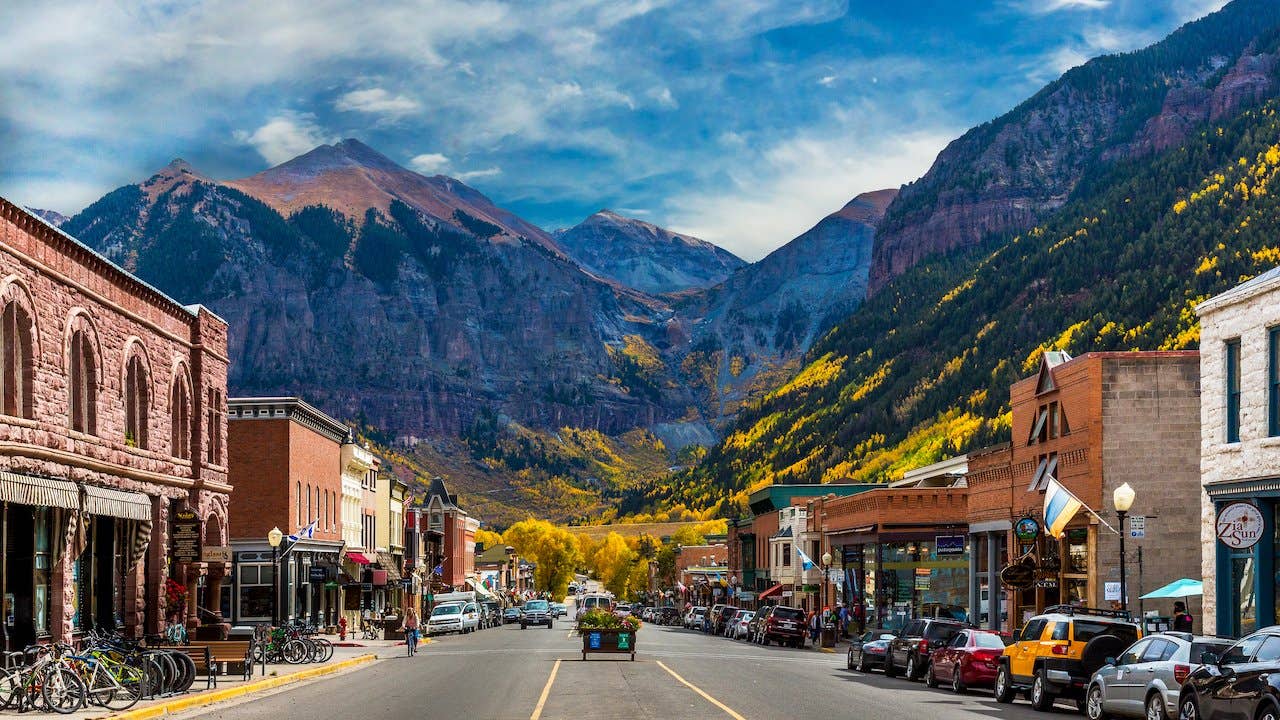Buying a house in Colorado: A how-to

If you’re thinking about buying a home in Colorado, you have plenty of tough decisions ahead. Do you want to be in the middle of the action in Denver? In a happening city like Boulder or Colorado Springs? Or are you looking for smaller towns or skiing meccas, like Durango, Crested Butte and Telluride? No matter where you decide to plant your roots, the Centennial State will put you closer to the beauty of the great outdoors. Read on to get a complete understanding of how to buy a home in Colorado.
How to buy a house in Colorado
Decide where to live in Colorado
First things first: This is a big state, so you need to narrow your search for the right place to buy a home. If you’re looking to live near a bigger city, Fort Collins takes the top spot on Bankrate’s list of best places to live in Colorado. While the Front Range along I-25 is the most densely populated part of the state, don’t forget about Grand Junction and towns farther west.
While it’s smart to look at the list prices of homes in each of the cities you’re considering, make sure to consider the cost of other essentials, too. For example, Bankrate’s Cost of Living Calculator shows that Denver is around 15 percent more expensive than Colorado Springs.
Tips for buying a house in Colorado
As you figure out how much you’ll need to spend to buy a home here, be aware that property values and competition levels vary dramatically across the state. If you’re looking to buy in the Denver metro area, the median sale price is now more than $635,000, according to the Colorado Association of Realtors — a 15.5 percent increase over last year. And the competition is fairly steep: Homes tend to stay on the market for only 14 days. Head west to Mesa County, though, and the median price is just $401,000, with homes staying on the market for much longer: 63 days, on average.
In addition to a home’s price tag, you’ll also need to know how much money you plan to put into a down payment. This will help you figure out how much financing you need, and whether the amount you need to borrow exceeds conforming loan limits. If it does, you’ll likely be looking for a jumbo loan, which tends to come with stricter credit requirements and higher rates.
Things to know about buying a house in Colorado
- Property taxes: While buying a home in Colorado can be expensive, paying taxes once you are a homeowner is much more affordable here compared with the rest of the country. According to data from the Tax Foundation, Colorado homeowners pay an average of just 0.54 percent of their home’s value in property taxes – one of the lowest rates in the country.
- Dual agency: When you work with a real estate agent to buy in Colorado, he or she will solely represent you. Colorado law prohibits dual agency, which means that agents cannot represent both the buyer and the seller in a transaction.
- Seller’s disclosure: Colorado requires sellers to complete a property disclosure form that shares all their knowledge about potential issues that could impact the value of the home. Read this carefully to be aware of any major problems, like past flooding or roof damage.
- Closing costs: Before you get the keys to your new Colorado home, you’ll need to hand over a check for all your closing costs. According to data from ClosingCorp, the average closing costs in Colorado totaled $3,881 in 2021 — or around 0.7 percent of the purchase price. Unlike most other states, in Colorado the buyer traditionally pays the real estate transfer taxes unlike most other states. Outside of state and local charges, closing costs will vary based on your lender. Be sure to compare Colorado mortgage lenders to see if there are options that do not charge origination fees.
- Attorneys: You are not required to hire a real estate attorney to buy a house in Colorado. However, it’s always wise to consider hiring professional legal help when you’re making a huge investment, particularly one that comes with complicated contracts and paperwork.
- Climate and weather: The natural beauty of Colorado also, unfortunately, holds potential for natural disasters. As you think about buying a home here, be sure to consider how much it will cost to protect it from wildfires and harsh winters. A study from the Colorado Division of Insurance revealed that the vast majority of homeowners who lost their properties in the Marshall Fire at the end of 2021 did not have enough insurance coverage. Colorado also ranked second for insurance claims due to hail between 2018 and 2020, according to the National Insurance Crime Bureau.
How much house can I afford in Colorado?
If you’re thinking about buying a house, you’re probably also contemplating how much you can actually afford to spend on one. The best guidance is to limit your monthly mortgage payment to no more than 28 percent of your monthly income. So, if you earn $6,000 each month, your mortgage payment should be $1,680 or less. The easiest way to lower that monthly obligation is to make a sizable down payment upfront, thus lowering the amount you need to borrow.
Saving for a down payment in Colorado
Coming up with a big down payment is not easy — particularly if you are a low-income homebuyer. If you’re paying rent, covering a car payment and handling all your other bills, it’s tough to set aside funds for buying a home as well.
Fortunately, you don’t have to do it all on your own. The Colorado Housing and Finance Agency has a number of first-time homebuyer programs that are designed to help that first step — the down payment — feel less impossible. With grants and deferred loans, you might be eligible to get between 3 percent and 4 percent of the purchase price to cover part of it. In addition to state and local programs, be sure to consider national down payment assistance options.
Getting preapproved for a mortgage
If you want to demonstrate that you are a serious buyer, show sellers that you can show them the money. A preapproval letter is proof that you are a qualified buyer with a lender that is highly likely to give you the cash you need. In a seller’s market like Colorado, getting preapproved is essential to give your offer credibility.
Finding the best lender
One of the most important steps in buying a home — in Colorado or anywhere — is shopping around to compare offers from multiple lenders. Some lenders might offer low rates that look appealing, but their fee structures could make your closing costs a headache. Others might only offer online assistance, a negative if you prefer to visit an in-person branch. Look into several options to find a deal that best serves your needs.
If you’re looking in a particularly competitive market, it might be worth exploring beyond traditional lenders. For example, companies like Ribbon and Orchard offer programs that can help you make a cash offer, making your bid look even better to a seller.
Finding the best local real estate agent in Colorado
Once you have a company to help you buy a home, it’s time to find the person who can help you find it. If you have friends or colleagues who have recently gone through the homebuying process, ask them for recommendations for a real estate agent. Having a professional Realtor on your side can make a big difference in eliminating some of the stress of trying to find a home in a seller’s market. Realtors have professional knowledge of their local area. Discuss your location preferences, your budget and your must-have amenities, and he or she can point you toward areas where your money will stretch the furthest.
House hunting
Now, it’s time for the fun part: You can begin visiting properties. House hunting can be frustrating if you wind up in a bidding war with buyers who have deeper pockets. But don’t get discouraged. Your real estate agent is there to help you navigate the challenges. And here’s a pro tip for looking at homes in Colorado, where there are plenty of resort-filled ski towns: Don’t forget about condos. While you may not get complete privacy, you will get a more affordable price point. Median townhouse and condo prices in the state cost around $150,000 less than single-family homes, according to the Colorado Association of Realtors.
Making an offer
When you find a place you love, your agent can help guide you through how to make a successful offer. Agents know how quickly you need to act: If the home has been sitting on the market for a while, you may be able to take your time and offer less than the asking price. However, if comps have been selling for more than the list price, you may need to think about offering well over. Around 59 percent of Colorado homes sell above ask these days, per Redfin data.
Getting a home inspection and appraisal
An accepted offer doesn’t necessarily mean you are locked into buying the home. You should immediately get a professional home inspection to make sure that the property is in good condition. Additionally, if you’re getting a mortgage, your lender will require an appraisal. This verifies that the home is worth what you have agreed to pay for it. Be prepared for the potential for a low appraisal, which has been fairly common in Colorado’s hot housing market.
Closing on your new Colorado home
Three days before you’re scheduled to close on your home, you’ll receive a closing disclosure that outlines all your final costs. Double-check that all the amounts look somewhat similar to your initial loan estimate, and get a certified or cashier’s check — personal checks are likely not accepted — for the final amount. However, before you hand off that large chunk of change, schedule a final walk-through. This should ideally take place directly before you go to your official closing, and it’s one last opportunity to verify that the home is in good condition for your move-in. If everything looks as it should, head to your closing, sign your name on a mountain of paperwork and then celebrate your new life in the actual mountains. You’re a Colorado homeowner now.
FAQs
-
Absolutely. Buying a house in Colorado helps you plant permanent roots in one of the most beautiful states in the country, where you can ski, hike, bike and enjoy the outdoors throughout all four seasons. Plus, the future looks very bright for your Colorado investment. By 2030, Renofi predicts that Colorado will have the fourth-highest home values in the country. So, you’ll be in a good position to sell whenever that time arrives.
-
Buying a house in Colorado is getting harder for anyone on a tight budget. The Colorado Association of Realtors’ Affordability Index has been steadily dropping over the past two years. There simply aren’t enough houses available to accommodate the number of people who want to move here. If you are among them, it’s important to consider the entire state — not just the most sought-after regions.
-
It depends on where in the state you’re looking to buy. If you want to be in the eastern part of Colorado, your budget can be relatively modest. In Kit Carson County, for example, the median sale price is just $215,000. Head west, though, and you might experience serious sticker shock: The median price in Pitkin County, home to the luxury properties of Aspen, is a whopping $7.25 million. Statewide, the overall median sale price is currently $589,000, so that’s a good starting point for your budget.
-
The median down payment on a home in Colorado was just over $83,000 in March of 2022. Some conventional loans will let you make a down payment as small as 3 percent of the purchase price — so, on a $600,000 home in Colorado, that would be $18,000. If you want to avoid paying for private mortgage insurance, though, you’ll need to make a 20 percent down payment. Don’t forget to budget for closing costs, too.
Why we ask for feedback Your feedback helps us improve our content and services. It takes less than a minute to complete.
Your responses are anonymous and will only be used for improving our website.






